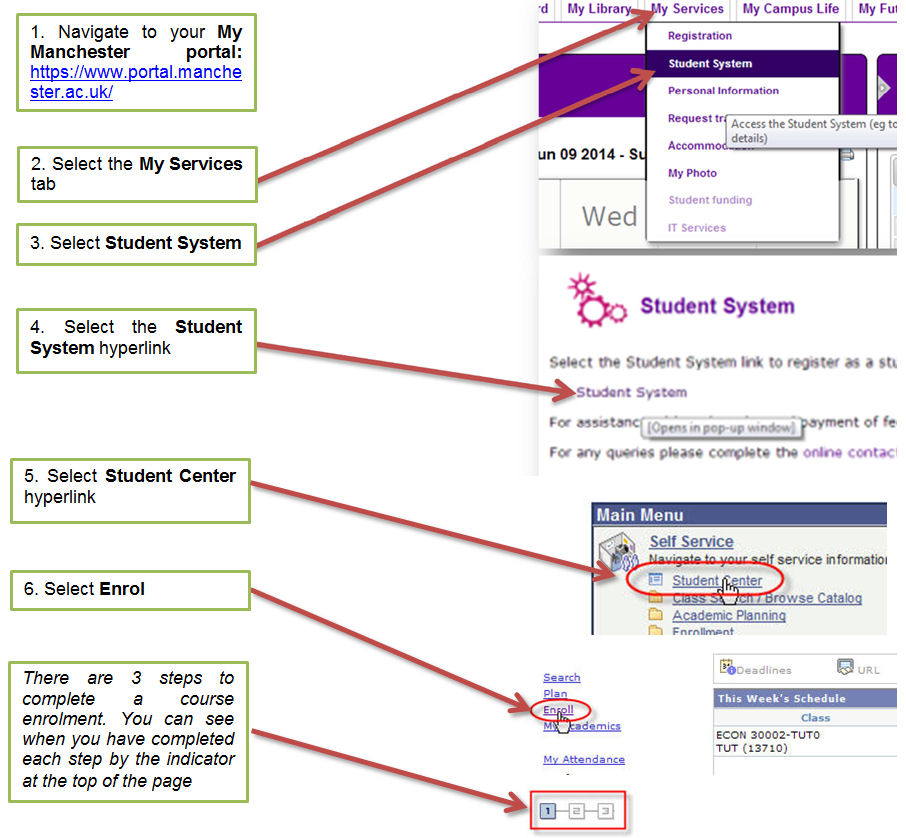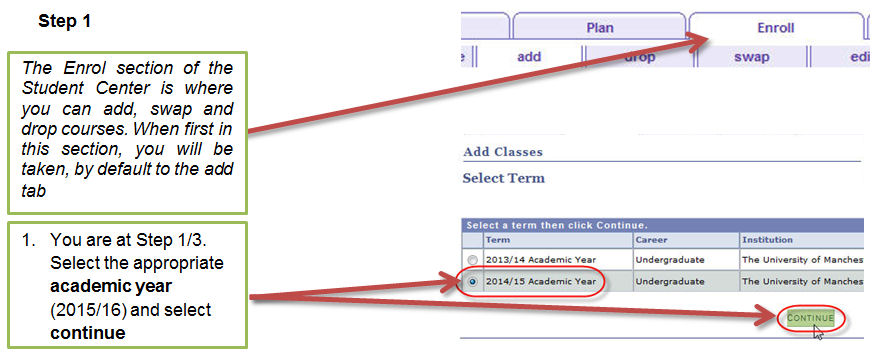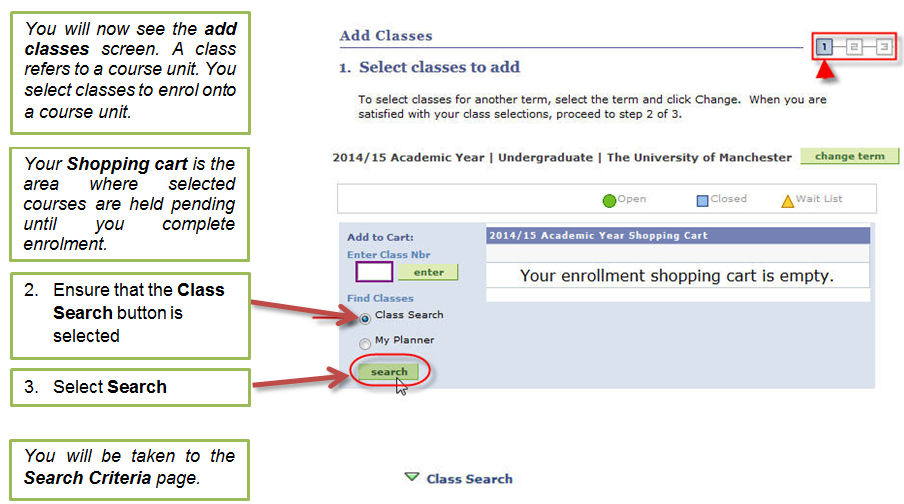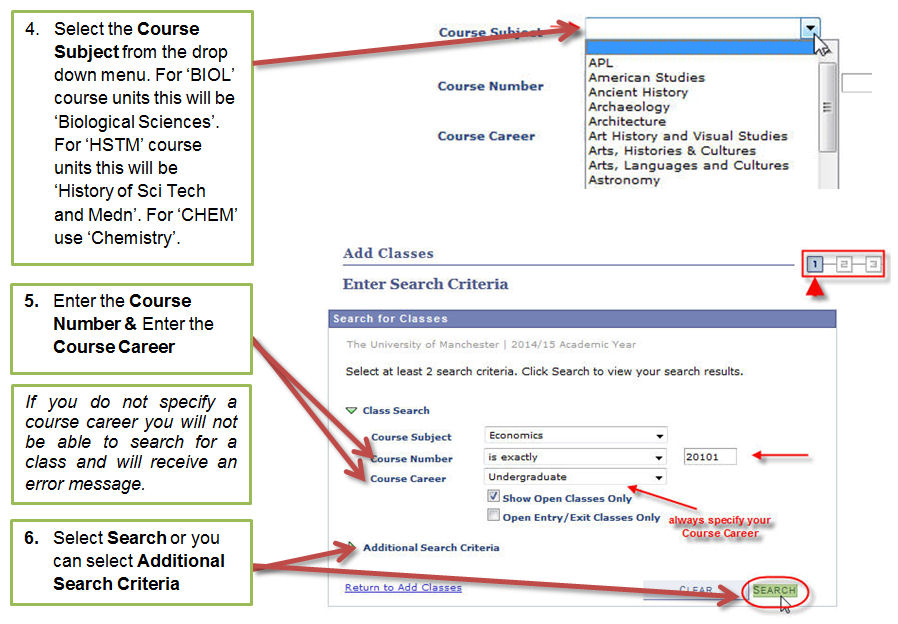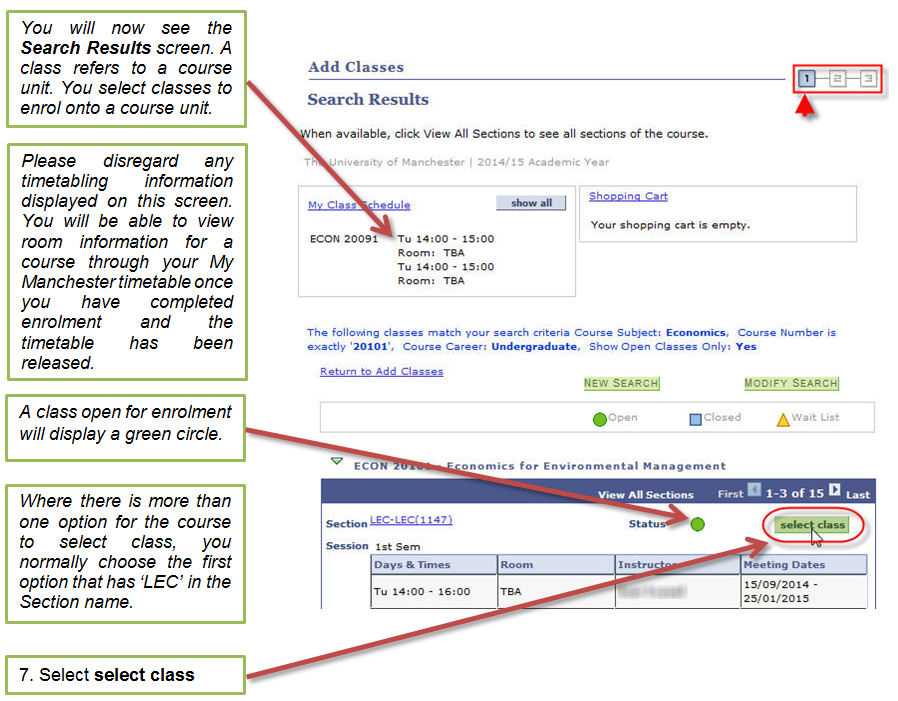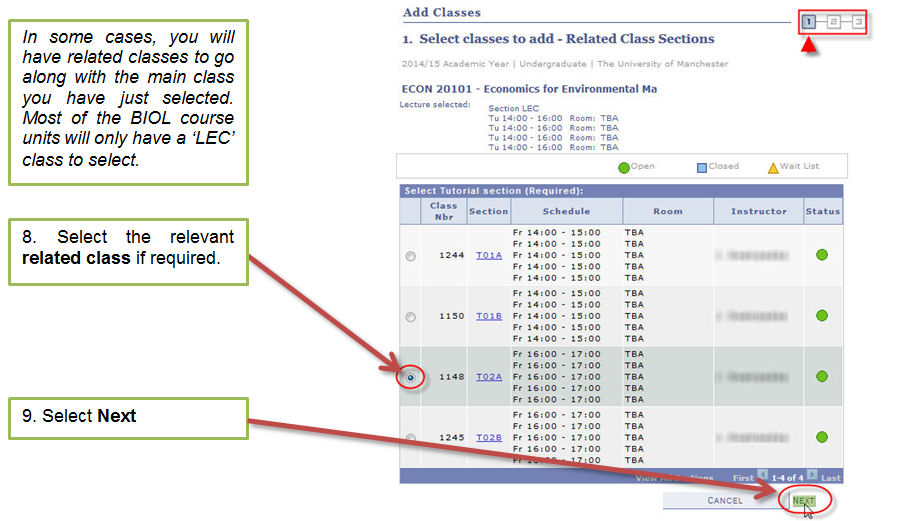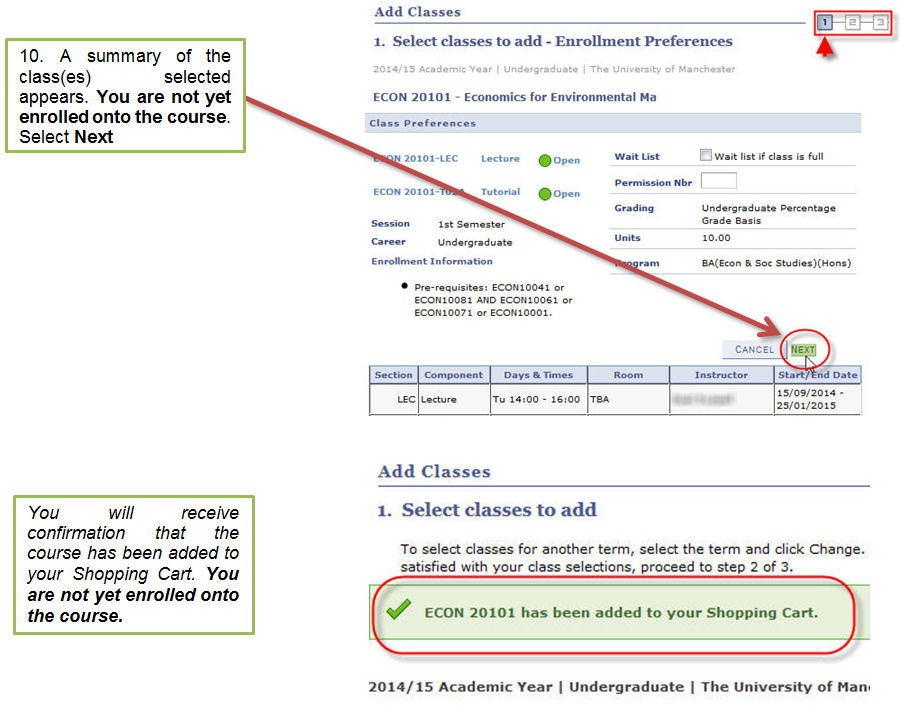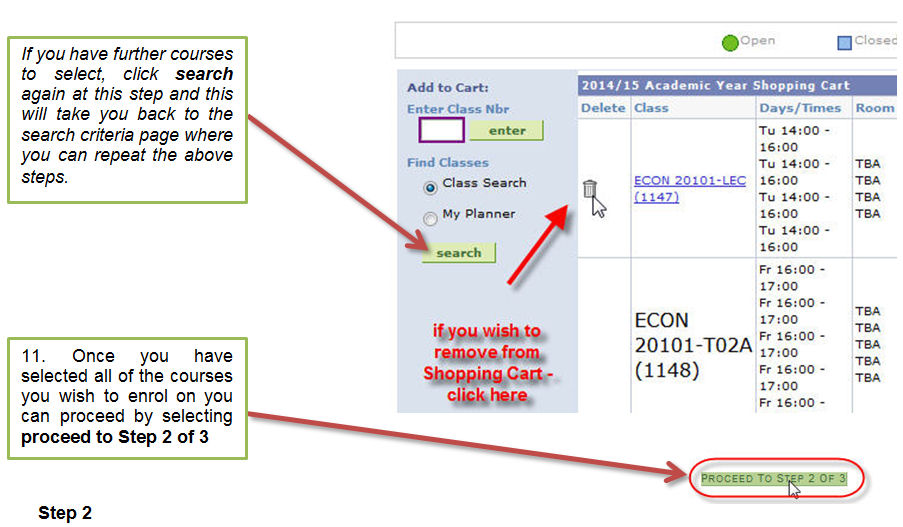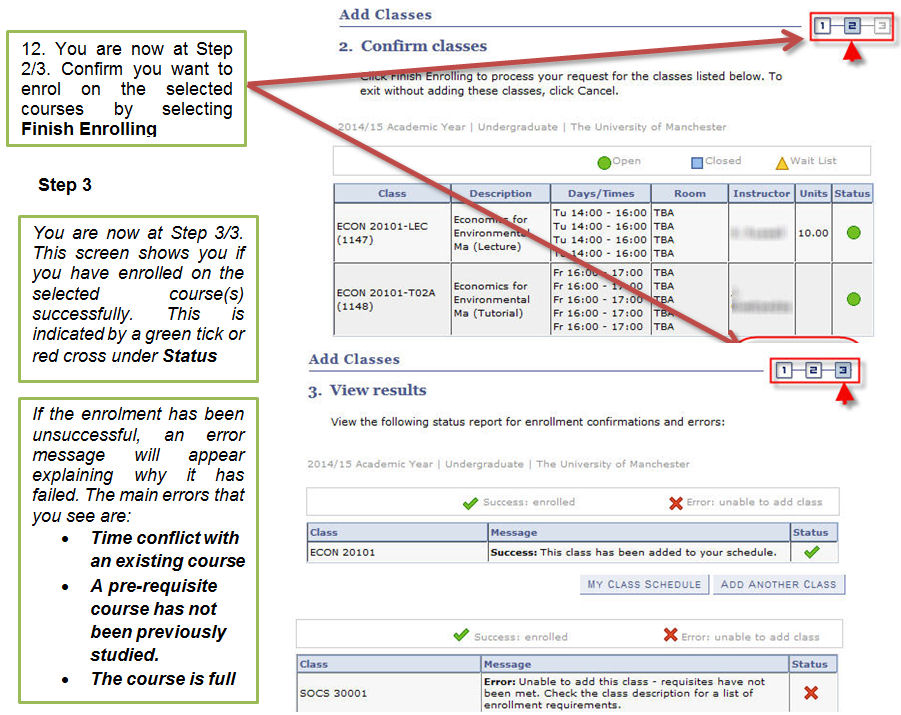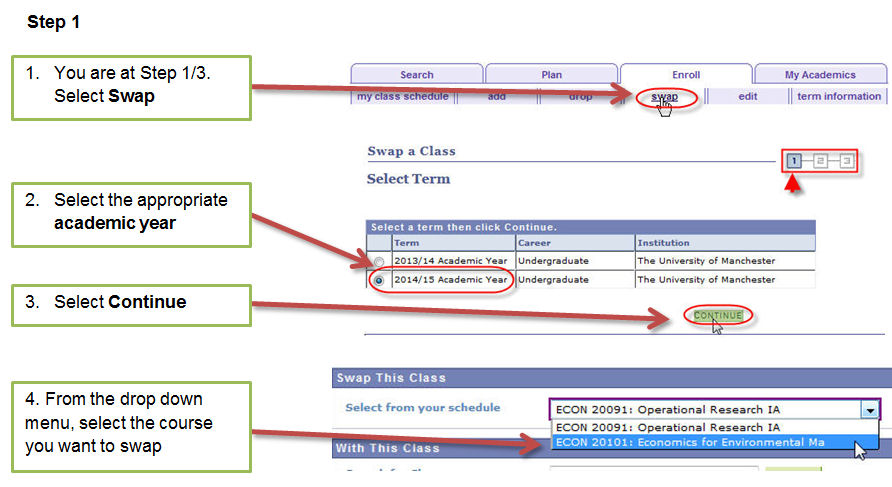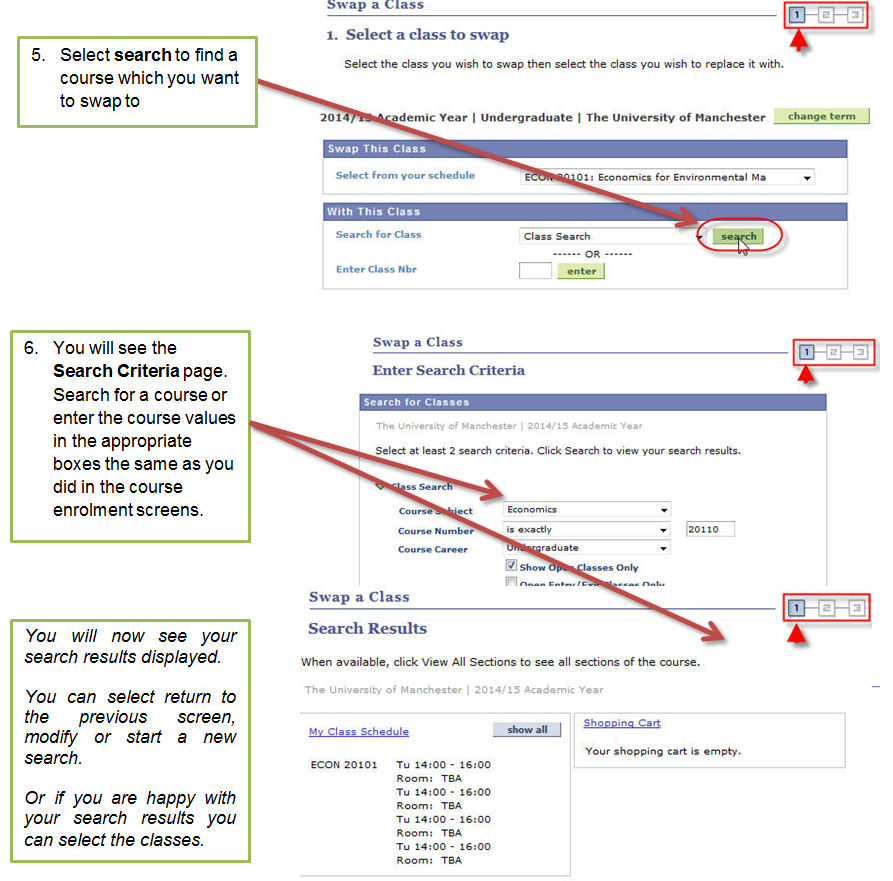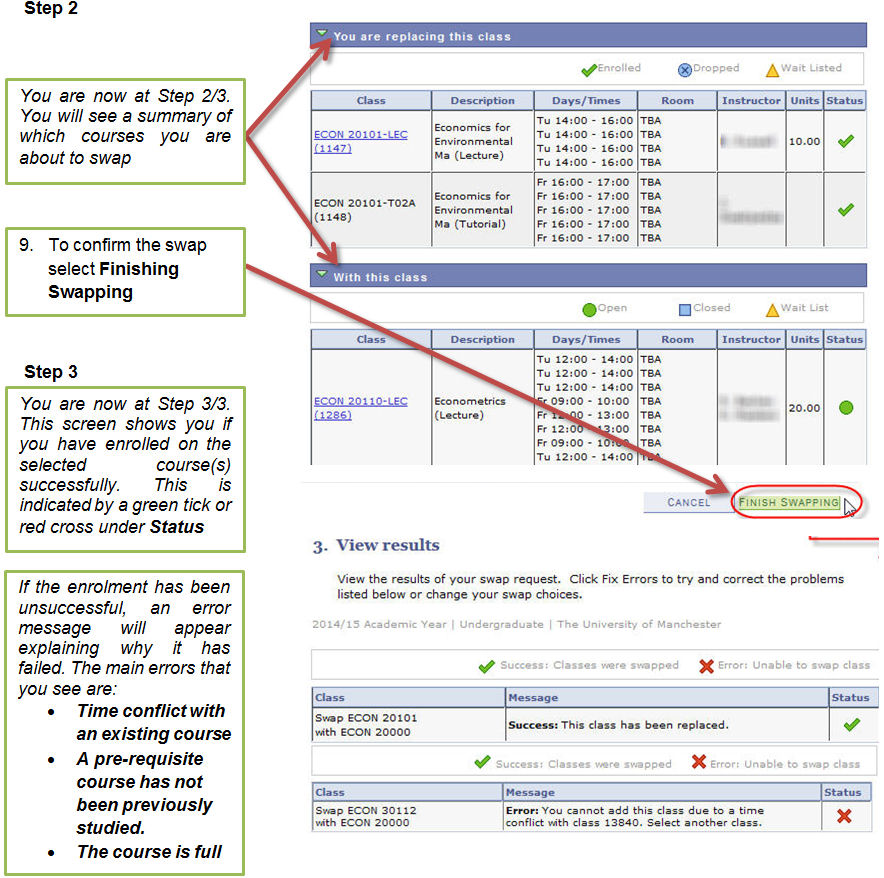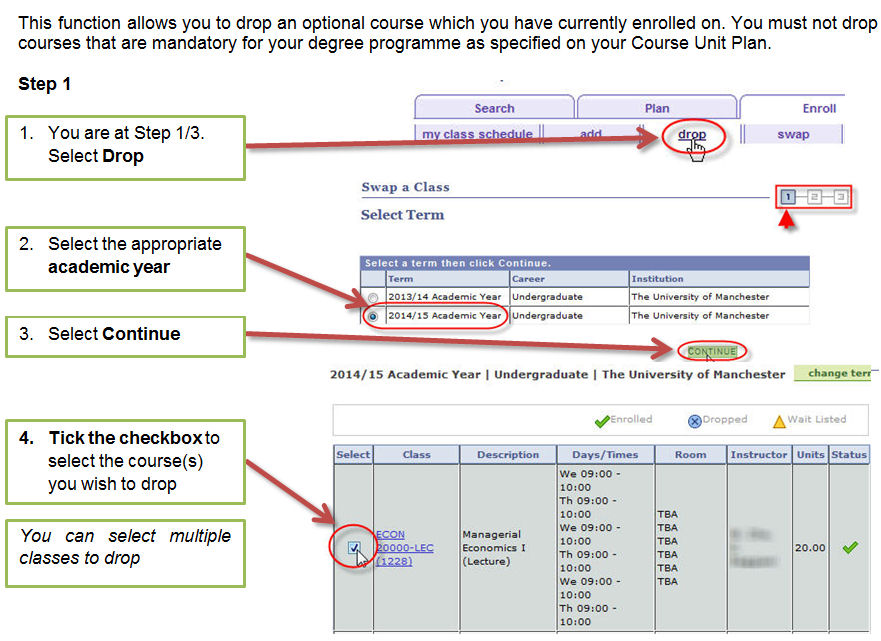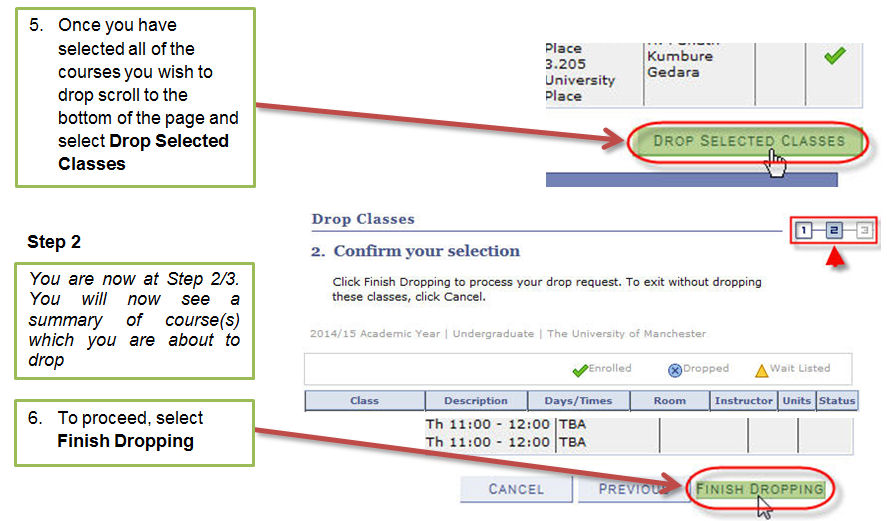Course Unit Selection - LEVEL 3 students
By September 2018, you will have already completed steps 1-4 and the information provided below is a reminder of these steps. From September 2018, you should follow step 5 and step 6 if necessary.
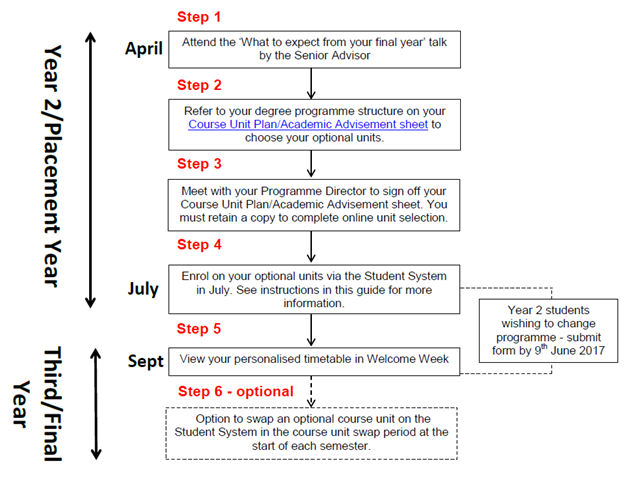
Academic Advisement sheets can be found on the intranet at the following link: https://www.intranet.ls.manchester.ac.uk/education/cm/academicadvisement.aspx
Step 1 – What to expect from your third year talk
What to expect from your third year talk
The ‘What to expect from your third year talk’ was held on Monday 16th April. Information was given about:
- Course unit selection (including Universituy College for Interdisciplinary Learning or UCIL and HSTM units)
- Problem/essay papers
- Employability
- PASS leaders
Changing degree programmes: Students wishing to change from one programme to another must complete a ‘degree programme change form’, which can either be downloaded from the Faculty intranet at www.intranet.ls.manchester.ac.uk/education/studentsupport/supportforms/default.aspx or collected from the Student Support Office (G.483 Stopford). Students must obtain the approval of both the ‘old’ and ‘new’ Programme Directors. There are, however, some restrictions depending upon which units you have taken (refer to the compulsory units for any programme you may be considering).
Please note that there is a deadline of 8th June 2018 for completing programme changes for the next academic year.
Step 2 – Choosing your optional units
 Degree Programme requirements
Degree Programme requirements
The requirements for each Degree Programme are laid out in a table at the below links. The table is designed to enable you to check which units are mandatory for your Degree Programme and which are recommended optional units. You may be able to take other units but you must be able to fit them into your timetable and you should talk to your Programme Director or Academic Tutor about this.
More detailed information on your Degree Programme structure for each level of study can be found on the Faculty intranet under the heading ‘academic advisement’ - https://www.intranet.ls.manchester.ac.uk/education/cm/academicadvisement.aspx
Academic Advisement is the term used in Campus Solutions for the way in which Degree Programmes are structured, e.g. which course units students take in each academic year, which of those units are mandatory, and which units may be selected as options. By following the above link you will be able to access the academic advisement documents for your Degree Programme. These sheets are used at registration for your Programme Director to agree your choice of units with you. All students take degree programme-specific Tutorial units in the final year. These will include a mixture of different exercises and problem-based-learning all related to the subject matter of the degree programme and are considered to be vital preparation for the degree programme papers in the final examinations (see unit entry under Tutorials for further details).
Course unit profiles
Profiles of the course units on offer from the School of Biological Sciences for the current academic year can be found via your MyManchester portal, as well as on the intranet. Profiles include Aims, Intended Learning Outcomes, lecture and/or practical content, along with details of the assessments, recommended texts and prerequisites. The Unit Coordinator and principal lecturers teaching on the unit are also listed. A list of the employability skills that the course unit will allow you to develop is also given; employers often ask for examples of these skills when applying for a job, either within your CV, on their job application form or during interviews. In addition to MyManchester, course unit information is also available on the School’s intranet.
Final year BIOL units run for a period of 6 weeks as opposed to 12 weeks. This means that final year BIOL units are classed as either ‘early’ or ‘late’, depending upon whether they run in weeks 1-6 semester 1 (early), weeks 2-7 semester 2 (early) or weeks 7-12 (late) of each semester. The following unit descriptions have ‘(E)’ or ‘(L)’ following the unit title to denote whether their timetabling is ‘early’ or ‘late’ in the semester.If you have any questions about a unit once it has started, you should approach the lecturer directly, or consult the Unit Coordinator.
Students wishing to contact a Unit Coordinator directly should do so by email.
Full descriptions of language units for those students taking the four-year degrees with a language are available from the Course unit information portlet.
In addition, information on course units run by the University College for Interdisciplinary Learning (available University-wide) can be found on their website. Details of how to contact the College are listed below.
Please note, although students are permitted to take units outside the School, timetable constraints may not allow some of these units to be taken in conjunction with some compulsory School. Please discuss this with your Programme Director.
Manchester Business School (BMAN units)
For further information please consult the BMaP Student Handbook and timetabling information at the following link: https://ughandbook.portals.mbs.ac.uk/Non-AllianceMBSstudents/BMaPcoursesandapplicationprocess.aspx
School of Arts, Languages and Cultures – Language units
Students registered on a ‘with language’ Degree Programme only.
If you are on a ‘with language’ degree, you will be able to self-select your Language units alongside your optional BIOL units on the Student System. If you have any problems with enrolling on your Language units please contact the language department:
School of Arts, Languages and Cultures
Faculty of Humanities
Samuel Alexander Building
www.alc.manchester.ac.uk
Languages Student Information Point
Tel: 0161 275 8311 / 0161 306 0396
Email: Salc-languages@manchester.ac.uk
Manchester Enterprise Centre (MCEL units)
Details of the course units offered and contact details can be found at the following link:
https://mec.portals.mbs.ac.uk/StudyEnterpriseWithUs/Undergraduateunits.aspx
School of Psychological Sciences (PSYC units)
PLEASE NOTE: PSYC units are only taken by students enrolled on the Cognitive Neuroscience & Psychology programme.
For information on PSYC units please contact ug.psychology@manchester.ac.uk.
School of Psychological Sciences
Coupland 1 Building
Coupland Street
https://www.bmh.manchester.ac.uk/psychology/
Programme Director – Dr Jennifer McBride (jennifer.mcbride@manchester.ac.uk)
University College (UCIL, ULBS, ULAR & ULCH units)
The University College for Interdisciplinary Learning presents an opportunity for students to broaden their educational horizons. It offers courses that showcase the research and knowledge found at the University and encourages student to go beyond the boundaries of their Degree Programme.
See the University College website for further information on available course units http://www.college.manchester.ac.uk/courses/. Students wishing to enrol on University College units can do so by self-selection via the Student System.
The Manchester Leadership Programme (MLP)
| UCIL20021 | Leadership in Action (sem 1) |
| UCIL20022 | Leadership in Action (sem 2) |
| UCIL20020 | Leadership in Action (sem 1&2) |
| UCIL20031 | Leadership in Action (sem 1) - online unit |
See the Manchester Leadership Programme website for further details of the course units on offer The Manchester Leadership Programme offers a unique combination of academic units and volunteering. MLP students:
- Learn the importance of leadership that promotes social, economic and environmental sustainability
- Gain an insight into some of the key issues facing 21st-century societies.
- Develop practical skills such as team working, project management and presentation skills.
Helpful hints
|
||||||||||||||||||
|
*Providing you have the pre/co-requisites.
Units that clash
Biological Sciences units that do not appear in the list below do not clash with any other biological sciences units and can therefore be taken in conjunction with any unit offered from within the School with the advice of your Programme Director.
No compulsory units should clash. If it seems that they do for you (e.g. with compulsory language units), please go to the Student Support Office as soon as possible (and well before the day of the first clash) to resolve this.
Clash Groups Semester 1 Weeks 1-6 (Early)
Clash Group 1
BIOL31321 – Glycobiology
BIOL31391 – Evolution of Genes
Clash Group 2
BIOL31311 – Protein Assembly, Dynamics & Function
BIOL31671 – Neuropharmacology of Human Health
Clash Group 3
BIOL31381 – Gene Regulation & Disease
BIOL31591 – Advanced Ion Transport
BIOL31551 – Human Impacts on the Biosphere
Clash Group 4
BIOL31351 – Current Topics in Microbiology
BIOL31471 – Advances in Behavioural Ecology
Clash Group 5
BIOL31351 – Current Topics in Microbiology
BIOL31441 – Cell Signalling
Clash Group 6
BIOL31561 – Human Reproductive Biology
BIOL31501 – Green Biotechnology
Clash Group 7
BIOL31471 – Advances in Behavioural Ecology
BIOL31371 – Advanced Immunology
Clash Group 8
BIOL31681 – Clocks, Sleep and the Rhythm of Life
HSTM32011 – From Baker Street to CSI
HSTM33021 – Climate Change and Society
Clash Group 9
BIOL31371 – Advanced Immunology
BIOL31551 – Human Impacts on the Biosphere
BIOL31681 – Clocks, Sleep and the Rhythm of Life
Clash Group 10
BIOL31721 – Hormones and Behaviour
BIOL31551 – Human Impacts on the Biosphere
Clash Group 11
BIOL31681 – Clocks, Sleep and the Rhythm of Life
BIOL31351 – Current Topics in Microbiology
Clash Group 12
BIOL31631 – Imaging in Biomedical Research
BIOL31381 – Gene Regulation & Disease
Clash Group 13
BIOL31721 – Hormones and Behaviour
BIOL33021 – Computational Approaches to Biology
HSTM32011 – From Baker Street to CSI
HSTM33021 – Climate Change and Society
Clash Groups Semester 1 Weeks 7-12 (Late)
Clash Group 1
BIOL31511 – Biotic Interactions
BIOL31571 – Advanced Endocrinology
BIOL31771 – Cell Adhesion
HSTM32011 – From Baker Street to CSI
HSTM33021 – Climate Change and Society
Clash Group 2
BIOL31411 – Protein Sorting
HSTM32011 – From Baker Street to CSI
HSTM33021 – Climate Change and Society
Clash Group 3
BIOL31411 – Protein Sorting
BIOL31541 – Living with Climate Change
Clash Group 4
BIOL31651 – Advances in Anatomical Sciences
BIOL31341 – Macromolecular Recognition
Clash Group 5
BIOL31411 – Protein Sorting
BIOL31461 – Chemical Communication in Animals
Clash Group 6
BIOL31651 – Advances in Anatomical Sciences
BIOL31451 – Comparative Developmental Biology
BIOL33031 – Data Science for Cognitive Neuroscience and Psychology
Clash Group 7
BIOL31301 – Post Genome Biology
BIOL31461 – Chemical Communication in Animals
BIOL33031 – Data Science for Cognitive Neuroscience and Psychology
Clash Group 8
BIOL31511 – Biotic Interactions
BIOL31571 – Advanced Endocrinology
BIOL31771 – Cell Adhesion
Clash Group 9
BIOL31341 – Macromolecular Recognition
BIOL33031 – Data Science for Cognitive Neuroscience and Psychology
Clash Group 10
BIOL31751 – Stem Cells
BIOL33031 – Data Science for Cognitive Neuroscience and Psychology
Clash Groups Semester 2 Weeks 1-6 (Early)
Clash Group 1
BIOL31482 – Conservation Biology
BIOL31612 – Neuroinflammation in Health & Disease
HSTM31212 – The Nuclear Age
HSTM30832 – Madness and Society
HSTM30232 - Health, Development and People
Clash Group 2
HSTM30232 - Health, Development and People
BIOL31742 – Molecular Biology of Cancer
Clash Group 3
BIOL31332 – Biochemical Basis of Disease
BIOL31692 – Learning, Memory and Cognition
Clash Group 4
BIOL31792 – Advanced Parasitology
BIOL31402 – Human Genetics and Evolution
BIOL31812 – Chemistry of Biological Processes
Clash Group 5
BIOL31362 – Bacterial Infections of Man
BIOL31622 – Ion Transport in Health and Disease
Clash Group 6
BIOL31742 – Molecular Biology of Cancer
HSTM 31212 – The Nuclear Age
HSTM30832 – Madness and Society
Clash Group 7
BIOL31582 – Cardiovascular Systems
BIOL31692 – Learning, Memory and Cognition
Clash Group 8
BIOL31332 – Biochemical Basis of Disease
BIOL31692 – Learning, Memory and Cognition
Clash Group 9
BIOL31602 – Toxins, Toxicants & Toxicity
BIOL31522 – Bioethics
Clash Group 10
BIOL31642 – Advanced Developmental Biology
BIOL31332 – Biochemical Basis of Disease
Final level units with pre-/co-requisites
Listed below are all the final level units in the School of Biological Sciences which have pre-/co-requisite units. If a unit has pre-/co-requisites, this means that you may need to take the unit(s) listed in order to take this unit. For example, BIOL21111 is a compulsory prerequisite for BIOL31311, therefore, if you did not take BIOL21111 in your second year, you will not be able to take BIOL31311 in your final year.
Bold indicates a compulsory prerequisite, italics indicate a recommended prerequisite
| Unit Code | Title | Prerequisite Unit Code | Prerequisite Unit Title |
| BIOL31301 | Post-Genome Biology | BIOL21152 | ‘Omic Technologies & Resources |
| BIOL31311 | Protein Assembly, Dynamics & Function | BIOL21111 | Proteins |
| BIOL31321 | Glycobiology: Glycan Function in Health & Disease | BIOL21111 | Proteins |
| BIOL21162 | Chemistry of Biomolecules | ||
| BIOL31332 | Biochemical Basis of Disease | BIOL21132 | Cell Metabolism & Metabolic Control |
| BIOL31341 | Macromolecular Recognition in Biological Systems | BIOL21111 | Proteins |
| CHEM10021 | Chemistry for Bioscientists 1 | ||
| CHEM10022 | Chemistry for Bioscientists 2 | ||
| BIOL31352 | Current Topics in Microbiology | BIOL21181 | Prokaryotic Microbiology |
| BIOL31362 | Bacterial Infections of Man | BIOL21192 | Principles of Infectious Disease |
| BIOL31371 | Advanced Immunology | BIOL21252 | Parasitology |
| BIOL21242 | Immunology | ||
| BIOL21192 | Principles of Infectious Disease | ||
| BIOL31381 | Gene Regulation and Disease | BIOL21101 | Genome Maintenance & Regulation |
| BIOL21152 | ‘Omic Technologies & Resources | ||
| BIOL31391 | Evolution of Genes, Genomes & Systems | BIOL21232 | Fundamentals of Evolutionary Biology |
| BIOL31402 | Human Genetics and Evolution | BIOL10521 | Genes, Evolution & Development |
| BIOL21232 | Fundamentals of Evolutionary Biology | ||
| BIOL21371 | Organismal Genetics | ||
| BIOL31411 | Protein Sorting | BIOL21141 | Cell Membrane Structure & Function |
| BIOL31441 | Cell Signalling | BIOL21101 | Genome Maintenance & Regulation |
| BIOL21121 | The Dynamic Cell | ||
| BIOL21141 | Cell Membrane Structure & Function | ||
| BIOL21261 | Endocrinology | ||
| BIOL21351 | Molecules and cells in Human Disease | ||
| BIOL31451 | Comparative Developmental Biology | BIOL21172 | Principles of Developmental Biology |
| BIOL31471 | Advanced Behavioural and Evolutionary Ecology | BIOL10521 | Genes, Evolution & Development |
| BIOL21232 | Fundamentals of Evolutionary Biology | ||
| BIOL21432 | Animal Behaviour | ||
| BIOL31482 | Conservation Biology | BIOL21232 | Fundamentals of Evolutionary Biology |
| BIOL31501 | Green Biotechnology | BIOL21152 | ‘Omic Technologies & Resources |
| BIOL21202 | Plants for the Future | ||
| BIOL31511 | Biotic Interactions | BIOL21202 | Plants for the Future |
| BIOL21211 | Ecology & Ecosystems | ||
| BIOL31541 | Living with Climate Change | BIOL21211 | Ecology & Ecosystems |
| BIOL31551 | Human Impacts on the Biosphere | BIOL21211 | Ecology & Ecosystems |
| BIOL31571 | Advanced Endocrinology | BIOL21261 | Endocrinology |
| BIOL31582 | Cardiovascular Systems | BIOL21141* | Cell Membrane Structure & Function |
| * one of these units must be taken as a compulsory pre-requisite | BIOL21321* | Membrane Excitability: Ion Channels & Transporters in Action | |
| BIOL21272 | Gut and Renal Human
Physiology |
||
| BIOL31591 | Advanced Ion Transport | BIOL10832 | Excitable Cells |
| *one of these RSM units must be taken as a compulsory pre-requisite | BIOL20922* | Neuroscience RSM | |
| BIOL20932* | Pharmacology RSM | ||
| BIOL20942* | Physiology RSM | ||
| BIOL21321 | Membrane Excitability: Ion Channels & Transporters in Action | ||
| BIOL31602 | Toxins, Toxicants & Toxicity | BIOL10832 | Excitable Cells |
| BIOL21302 | Clinical Drug Development | ||
| BIOL31612 | Neuroinflamation in Health and Disease | BIOL10832 | Excitable Cells |
| BIOL21312 | Drugs & the Brain | ||
| BIOL31622 | Ion Transport in Health and Disease | BIOL10832 | Excitable Cells |
| * one of these RSM units must be taken as compulsory pre-requisite | BIOL20922* | Neuroscience RSM | |
| BIOL20932* | Pharmacology RSM | ||
| BIOL20942* | Physiology RSM | ||
| BIOL31591 | Advanced Ion Transport | ||
| BIOL31642 | Advanced Developmental Biology | BIOL21172 | Principles of Developmental Biology |
| BIOL31651 | Advances in Anatomical Sciences | BIOL20912 | Human Anatomy RSM |
| BIOL21291 | Human Anatomy & Histology | ||
| BIOL21402 | Anatomy of the Special Sense Organs | ||
| BIOL31671 | Neuropharmacology of Human Health | BIOL21312 | Drugs & the Brain |
| BIOL31681 | Clocks, Sleep and Rhythms of Life | BIOL21332 | Motor Systems |
| BIOL21341 | Sensory Systems | ||
| BIOL31691 | Learning, Memory and Cognition | BIOL21332 | Motor Systems |
| BIOL21341 | Sensory Systems | ||
| BIOL31721 | Hormones and Behaviour | BIOL21261 | Endocrinology |
| BIOL21172 | Principles of Developmental Biology | ||
| BIOL31742 | Molecular Biology of Cancer | BIOL21101 | Genome Maintenance & Regulation |
| BIOL21121 | The Dynamic Cell | ||
| BIOL31751 | Stem Cells | BIOL21121 | The Dynamic Cell |
| BIOL21172 | Principles of Developmental Biology | ||
| BIOL21351 | Molecules and Cells in Human Disease | ||
| BIOL31771 | Cell Adhesion | BIOL21121 | The Dynamic Cell |
| BIOL31792 | Advanced Parasitology | BIOL21242 | Immunology |
| BIOL21252 | Parasitology | ||
| BIOL31371 | Advanced Immunology | ||
| BIOL31802 | Immune Response and Disease | BIOL21242 | Immunology |
| BIOL31371 | Advanced Immunology | ||
| CHEM31812 | Chemistry of Biological Processes | CHEM21162 | Chemistry of Biomolecules |
Withdrawal of units
The information provided is correct at the time of publication. The School reserves the right to withdraw or alter units should there be changes in academic staff or insufficient registrations.
Step 3 – Meeting your Programme Director
You are required to attend a meeting with your Programme Director to choose your optional units for the final year of your degree. You will complete a course unit plan in consultation with your Programme Director at the meeting to record your choice of units - you must retain a copy for your records.
*It is important that you retain a copy of your Course Unit Plan as you will need to enrol on your optional units yourself over the summer period.*
Copies of the third year draft 2018-19 timetable will be made available at this meeting so you can choose clash free options, however please note that the timetable is still draft at the stage as we do not have final timetable allocations until the end of the summer. No compulsory units should clash. You must make sure that your timetable is clash free when you return in September when room booking information has been released.
There are two reasons for asking you to choose optional units at this time of year; i) to provide all students with a personalised timetable at the beginning of the new academic year; ii) to ensure that the lecture theatres booked for your lectures are of an appropriate capacity for the cohort. You will, of course, still be able to change optional course units up to the end of the second week of each ‘early’ semester one unit and after the end of the first week for ‘late’ semester units and ‘early’ semester two units..
The Programme Director Course Unit Selection Clinics will take place w/c 23rd April 2018 and a detailed timetable can be found on the intranet.
Placement students
You may want to discuss your options with your Academic Tutor before making your choice of optional units. You can do this by contacting them via email (or if you have not filled in a second meeting form on the intranet yet, this would be a good time to do that, so you can update them on your progress as well as getting advice).
If your placement is in the Manchester area you may wish to attend the Programme Director meetings.
Once you have decided which optional units you would like to choose, please complete the relevant course unit plan and return it to studentsupportoffice.sbs@manchester.ac.uk.
*It is important that you retain a copy of your Course Unit Plan as you will need to enrol on your optional units yourself over the summer period.*
Intercalating Medical students
If you are an intercalating medical student you will meet with your Programme Director in September when you have an active SoBS record on the Student System.
Step 4 - Enrolling on your optional units
You should already be enrolled on your mandatory units however you MUST enrol on your optional units yourself listed on your signed off Course Unit Plan from 23rd July - 12th August. Please note that all students will be enrolled on the generic Project unit code BIOL30030 until the project allocations have been finalised in September. Once they have been finalised the Student Support Office will transfer you to your allocated project.
Intercalating Medics
If you are an intercalating medic you will choose your optional units on the Student System in September when you have an active Biological Sciences record.
‘With Language’ degree students
If you are on a ‘with language’ degree, you will be able to self-select your Language units alongside your optional BIOL units on the Student System. If you have any problems with enrolling on your Language units please contact the language department (see section School of Arts Languages and Cultures – Language units).
University College for Interdisciplinary Learning (UCIL) course units.
You will not be able to self-enrol on the following UCIL units:
- Leadership of Learning - UCIL20001 / 20002 / 21002
- Physics and the Grand Challenges of Today – UCIL29002
- Language courses – ULBS20011 / 20012, ULAR10031 and ULCH10022
To enrol on these units please email universitycollege@manchester.ac.uk.
Language Enhancement Access Programme (LEAP)
The University offers courses to students who wish to study a language as part of LEAP. Further information is available from: www.langcent.manchester.ac.uk/undergraduate/leap.
If you are considering registering for a language module you must discuss this with your Programme Director. If your Programme Director authorises your application for a LEAP course, you must enrol with the LEAP office by filling in an enrolment form which can be accessed at the link below. Enrolment will be conducted on a first-come first-served basis and you are therefore strongly advised not to leave it too late.
Manchester Leadership Programme (MLP)
You are now able to self-enrol onto an MLP course units. There are a very limited number of places so please ensure you complete enrolment early to avoid disappointment.
Manchester Enterprise Centre units (MCEL)
Please contact MCEL directly to enrol on an optional MCEL unit. Details of the course units offered and contact details can be found at the following link: https://mec.portals.mbs.ac.uk/StudyEnterpriseWithUs/Undergraduateunits.aspx
School of Psychological Sciences (PSYC units)
PLEASE NOTE: PSYC units are only taken by students enrolled on the Cognitive Neuroscience & Psychology Programme. For information on PSYC units please contact ug.psychology@manchester.ac.uk. https://www.bmh.manchester.ac.uk/psychology/.
Compensated passes and referrals in pre-requisite units
If you have a compensated pass e.g. 32C for a pre-requisite unit of a second year unit you will not be able to self-enrol for the unit on the Student System. Similarly if you have a referral for a pre-requisite unit of a second year unit you will not be able to self-enrol for the unit on the Student System. If this applies to you please email the Student Support Office so they can enrol you: studentsupportoffice.sbs@manchester.ac.uk.
Logging in to the Student System
Step 5 – Viewing your personalised timetable
Your personalised timetable is in My Manchester from Welcome Week onwards. Please note that when you change your Course Unit Selections it will take at least 24 hours to update your personalised timetable. No compulsory units should clash. If it seems that they do for you (e.g. with compulsory language units), please go to the Student Support Office as soon as possible (and well before the day of the first clash) to resolve this.
BIOL30000 Academic Tutorials Year 3
Your Academic Tutor will notify you of the time and location of your tutorial.
Step 6. Swapping an optional course unit
You may change any optional units (except language units that run for two semesters) up to the end of the second week of ‘early’ semester one units and after the end of the first week for ‘late’ semester one units. In semester two you may change any BIOL optional units up to the end of the first week of teaching (end of week two of the academic calendar). To do this you will need to log into your Student System in the same way as you did when you completed course unit selection. Further instructions are shown below. Please note that you must ensure that you do not drop or swap any course unit that is a mandatory course unit within your programme regulations. You must ensure that any changes you make to your course unit selections still satisfy your programmes academic advisement rules. Academic advisement rules can be found at the following link: https://app.bmh.manchester.ac.uk/education/cm/academicadvisement.aspx.
Please note that enrolment reports will be sent to your Programme Directors for checking and you will be contacted if your enrolment selections are not satisfactory. Failure to swap a unit before the end of the course unit swap period may mean you will not be allowed to register for the examinations in the unit to which you have changed. You will not normally be allowed to transfer off or onto a unit after the end of the second week of teaching (Friday 5pm) in each semester.
Semester one late unit changes
If you wish to swap a semester one late unit you will not be able to do process this yourself on the Student System. Instead you must complete a ‘Course Unit Change Form’ if you wish to make any changes. Forms can either be collected from the Student Support Office (G.483 Stopford) or downloaded from the intranet. Your Programme Director must confirm to you by email or signature on the form that he/she approves the change, and you must then take the completed form, together with email verification where relevant, to the Student Support Office by the end of week 7 so the Office can swap your unit for you.
Drop, Swap and Edit a Course unit
Once you have enrolled for a course unit(s) you can make changes to your selection by using the drop and swap functionality. You will need to log into your Student System in the same way as you did when you completed the course enrolment. https://www.portal.manchester.ac.uk/. For all three functionalities you must select the Student Center and then select Enrol as shown below.
*It is important that you do not drop or swap any course unit that is a mandatory course unit within your programme regulations.*
Swapping a Course
This function allows you to change the courses you have already enrolled upon in a single process; instead of dropping a course and then adding a new one.
Help and Support
COURSE UNIT SELECTION DROP-IN CLINICS
- Wednesday 19th September 14:00-16:00 - Year 1 only
- Thursday 20th September 11:00-13:00 - All years
- Friday 21st September 16:00-17:00 - All years
- Tuesday 25th September 12:00-13:00 - Year 1 only
All sessions are in Stopford Building, PC Cluster 1 (located near the reception at the front of the Stopford Building).
REGISTRATION AND IT SERVICES HELPLINE
Please contact:
+44(0) 161 306 5544 (09.00 – 17.00, Monday to Friday)
Email: ssc@manchester.ac.uk
WRONG PROGRAMME/PROBLEMS WITH MANDATORY AND OPTIONAL UNITS
School of Biological Sciences Student Support Office
G.483 Stopford Building
Tel: 44 (0)161 275 1487 (08.30 – 17.00, Monday to Friday)
Email: studentsupportoffice.sbs@manchester.ac.uk
Glossary
Campus Solutions Glossary of Terms
Introduction
This Glossary describes terms used in the Campus Solutions Student System and describes general usage including University of Manchester terminology.
| Campus Solutions Term | University Of Manchester Usage/Definition | Alternative Terminology |
| Academic Career | Study path e.g. Undergraduate, Postgraduate Taught | Career/Study Level |
| Academic Group | Any body that can offer a course be it Faculty, School, Division, Subject Area | School/Faculty |
| Academic Plan | A plan of the programme especially where there are specialisations | Programme |
| Academic Programme | A course of Study made up of one or more course units which leads to an award | Programme |
| Class | A scheduled instance of a course unit | Session |
| Class Enrolment | Choice and enrolment of both mandatory and optional course units | Course Unit Selection |
| Course | An individual study unit of the programme | Course Unit or Module |
| Degree | The award normally achieved at the end of the programme | Award |
| Emplid/ID | The number generated by Campus Solutions unique to the individual, whatever the role. For students it will also be their registration number. | Person ID/Registration Number |
| Facility | Class or meeting venue | Building |
| Matriculate | The process by which applicants are converted to students. | Roll Forward |
| Session | A session can be either one of the two semesters or the full term | Semester |
| Term | Academic year running from September to June | Academic Year |
| Term Activate | The process by which the system is informed that admitted and matriculated students are eligible to enrol on classes in a particular term | Expected to register |
| Units | An award is achieved by attaining a mandatory amount of units (units are earned by completion of a course) | Credits |
Campus Solutions Progression Terminology
- ACTV (Activate) – progress normally or complete successfully
- REVW (Review)
- ACTR (Activate Pending Re-sit Results)
- RYIA (Repeat Part Year in Attendance)
- RYOA (Repeat Year Out of Attendance)
- SPCL (Special Circumstances)

